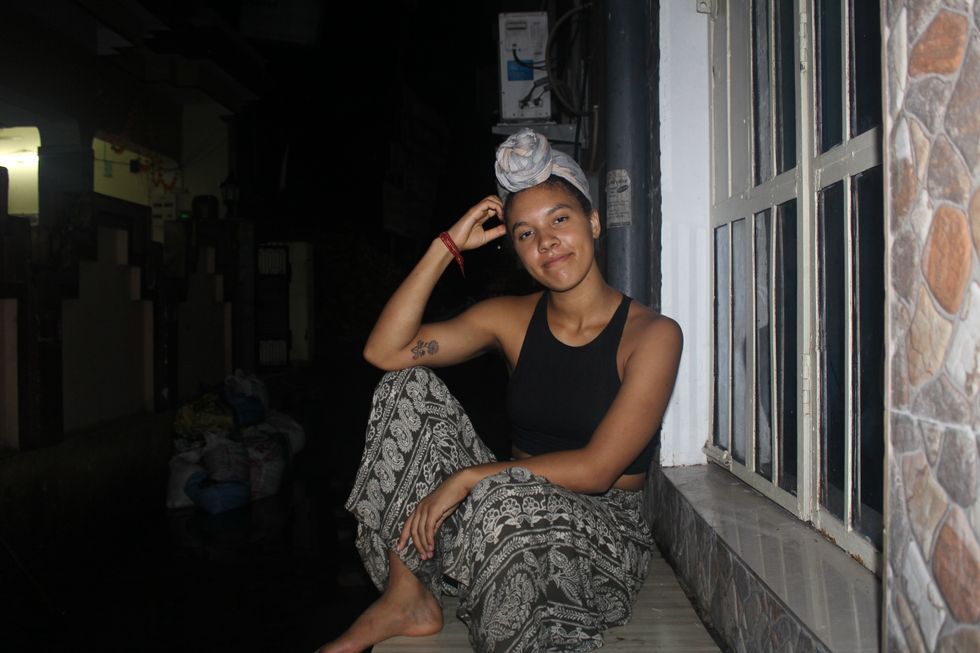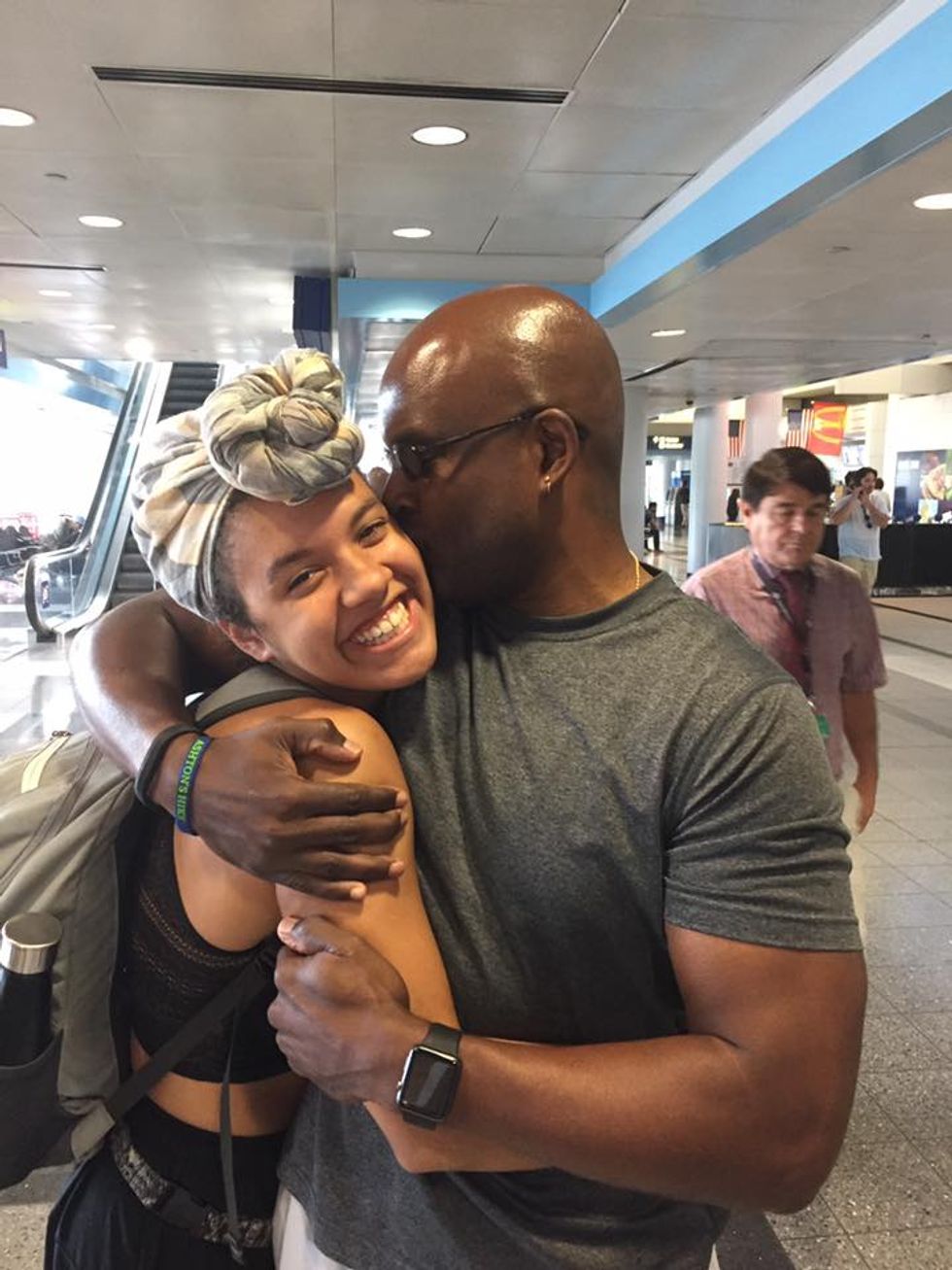This summer I spent a month in India, traveling and studying yoga. I went in quite the historically relevant moment; thousands if not millions of westerners (like me) have fled into yoga schools in India over the last several years, and the yoga teacher workforce is expanding to the point of over-saturation. Still, despite yoga's Eastern roots, the yoga industry in the West is successfully reducing yoga to a fitness practice full of expensive leggings and Instagram sponsorships. Our newfound “interest in Indian culture” has led to Selena Gomez and other white women wearing bindis to music festivals which has sparked a fiery social media debate over the difference between cultural exchange and cultural appropriation (you can read more on that here).
Knowing this, throughout my time in India I struggled with struggled with the general implications of me, a westerner, bringing yoga back to a country where it’s removed from its culture. I also struggled with wanting to wear saris and bindis but not knowing if I should.
I understood the concept of cultural appropriation, but damnit, bindis are cute and I still wanted to be able to justify my wearing one while here in India. What’s the big deal, right? It wasn’t until I was personally affected by cultural appropriation that it really hit home how serious this issue is.
I am a biracial woman of Afro-Caribbean descent. My dad’s mom came to the United States from Belize when she was 16 years old, and although they lived in a Belizean community in Chicago, I grew up in a majority white community in central Illinois. Today, like many other women of African descent, I sometimes wear a headscarf around my curly afro, but you may be surprised to find out how much internal battle is behind this seemingly simple act. I’m not exaggerating when I say that my headscarf carries the collective trauma of an entire population of black women. So yes, of course, I appreciate when people compliment and admire this piece of my culture. But I also get upset when any compliment a (white) woman gives me is immediately followed by “I wish I could wear one of those,” and then “maybe I should”.
The very idea that my headscarf is a mere accessory that is just kind of “up for grabs” by anyone and everyone deeply hurts me. To understand this, you have to understand that I have 10+ years of memories of struggling with my hair. In third grade, I began to beg my mom to let me stop wearing braids, and by sixth grade, I had begun chemically relaxing my hair to make it appear longer and straighter. It took me until senior year of high school to go back to my natural kinky-curly hair, a rather political decision that required confronting my own internalized racism and fighting back against our society’s white European standards of beauty. It was another year until I was bold enough to wear a headscarf, something that was by no means easy for me to do even though it represents my own culture and history. Even when I started wearing headscarves I still never wore them when I might come in contact with people that knew me, instead reserving them for those lecture hall classes where I could blend in easier.
But when white people slap on a headscarf for the sake of fashion, they don’t deal with the same problems I do. It doesn’t carry the same weight for them-- the weight of prejudice and subsequently internalized racism, being bothered by classmates or ogled at on the streets for my exotic-ness. I’m offended even at the mention of their desire because it strips my headscarf of its cultural significance. They could wear it without stigma, without years of memories of being made fun of and seen as “less than”.
White girls have gotten to straighten and curl their hair for every special event. They got to comb each others’ hair and partake in braiding trains at recess. I was the one who felt excluded every single time, acutely aware that I somehow did not belong. And of course, they never complimented the braids and clips my mom had given me. Now, with my headscarf, I finally have something that is mine. It represents my acceptance of myself and my roots, so forgive me if I want you to have to feel left out of this one.
We justify our appropriative actions by saying we’re “appreciating culture”, and that should be celebrated. Anyone who talks about cultural appropriation is just too sensitive, making a big deal out of something that’s just a compliment. Imitation is the highest form of flattery, right?
This is the response I received from a friend, we’ll call her T, last week when this topic came up. What made me so upset was the way such an opinion blatantly invalidates the concerns of people of color. Frankly, as a white person, and therefore someone of the dominant culture, T does not have the authority to decide what’s acceptable and what’s not.
But T did exactly what we all should do when we are confronted with a situation like this: she listened. She was genuinely interested in my story and asked me questions about my experiences, open to everything I had to say.
So back to my bindi question: In light of my recent experience with T, I decided to turn to the underrepresented voices of those it affected for my answer. Here are links to just a few great articles I found on the topic:
Everything You Should Know Before Sticking A Bindi On Your Head
I'm Indian, Don't White-Wash My Culture By Wearing A Bindi
Can People Of Color Culturally Appropriate
We surely can have the same conversation over headscarves, dreadlocks, and headdresses. Needless to say, I decided not to wear bindis except with my sari at graduation (where our teachers encouraged us to dress in traditional attire). And after I visited the Grand Mosque in Abu Dhabi, I retired my hijab.
So, there’s the lesson. Remember that this is a much larger issue than your appreciation of other cultures or even the feelings of people of other cultures. This is about a long history of dominant cultures oppressing colored peoples (while picking and choosing the parts of their cultures they wish to keep or throw out). My advice is to just be aware, keep your eyes open. Have a little empathy, some compassion, find the power imbalances, and talk to people on the oppressed side. If you think what you’re about to do might be cultural appropriation, listen to the silenced voices and make sure they feel heard.

















